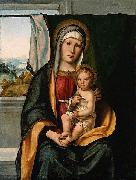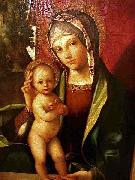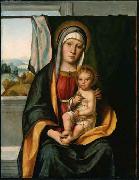Boccaccio Boccaccino Huiler la Reproduction de TableauAll Boccaccio Boccaccino Oil Paintings(c. 1467 - c. 1525) was a painter of the early Italian Renaissance, belonging to the Emilian school. He is profiled in Vasari's Le Vite delle pie eccellenti pittori, scultori, ed architettori (or, in English, Lives of the Most Excellent Painters, Sculptors, and Architects). He was born in Ferrara and studied there, probably under Domenico Panetti. Few facts of his life are known. His principal artistic activity was in Venice, Ferrara, and especially in Cremona, where he founded a school in which Garofalo was a pupil. His most celebrated achievement is the frescoes in the Cathedral of Cremona (1506-1519) representing the Birth of the Virgin and some subjects from her life. His position there was taken over by Altobello Melone. His remaining works, which include the Marriage of Saint Catherine (Accademia), the Virgin and Child with Four Saints (Venice, San Giuliano), the Virgin and Two Saints (Cremona, San Quirilo), and the Holy Family (Paris, Louvre), are considered by Lanzi remarkable for richness of drapery, variety of color, spirit and grace of attitude, and harmony of landscape. Several works formerly attributed to Pietro Perugino, Pinturicchio, and Garofalo are now ascribed to Boccaccino. His son and pupil Camillo Boccaccino (1501-46) was a painter at Cremona. |
|||

|
|||
|
|
|||
|
||||||||||||
| Boccaccio Boccaccino (c. 1467 - c. 1525) was a painter of the early Italian Renaissance, belonging to the Emilian school. He is profiled in Vasari's Le Vite delle pie eccellenti pittori, scultori, ed architettori (or, in English, Lives of the Most Excellent Painters, Sculptors, and Architects). He was born in Ferrara and studied there, probably under Domenico Panetti. Few facts of his life are known. His principal artistic activity was in Venice, Ferrara, and especially in Cremona, where he founded a school in which Garofalo was a pupil. His most celebrated achievement is the frescoes in the Cathedral of Cremona (1506-1519) representing the Birth of the Virgin and some subjects from her life. His position there was taken over by Altobello Melone. His remaining works, which include the Marriage of Saint Catherine (Accademia), the Virgin and Child with Four Saints (Venice, San Giuliano), the Virgin and Two Saints (Cremona, San Quirilo), and the Holy Family (Paris, Louvre), are considered by Lanzi remarkable for richness of drapery, variety of color, spirit and grace of attitude, and harmony of landscape. Several works formerly attributed to Pietro Perugino, Pinturicchio, and Garofalo are now ascribed to Boccaccino. His son and pupil Camillo Boccaccino (1501-46) was a painter at Cremona. |
||||||||||||
|
|
||||||||||||
| ID de tableau:: 83562 Virgin and Child Virgin and Child Date between 1500(1500) and 1505(1505) Medium Oil and tempera on panel Dimensions Height: 81 cm (31.9 in). Width: 62 cm (24.4 in). cjr Date between 1500(1500) and 1505(1505) Medium Oil and tempera on panel Dimensions Height: 81 cm (31.9 in). Width: 62 cm (24.4 in). cjr |
||||||||||||
|
|
||||||||||||
| ID de tableau:: 92047 Virgin and Child Virgin and Child Oil on panel Muzeul National de Arta, Bucharest Date 1510s cjr Oil on panel Muzeul National de Arta, Bucharest Date 1510s cjr |
||||||||||||
|
|
||||||||||||
| ID de tableau:: 96447 Madonna Madonna oil on canvas cyf oil on canvas cyf |
||||||||||||
|
|
||||||||||||
|
| Artiste précédent Artiste prochain | |||||||||||
|
|
||||||||||||
|
Boccaccio Boccaccino (c. 1467 - c. 1525) was a painter of the early Italian Renaissance, belonging to the Emilian school. He is profiled in Vasari's Le Vite delle pie eccellenti pittori, scultori, ed architettori (or, in English, Lives of the Most Excellent Painters, Sculptors, and Architects). He was born in Ferrara and studied there, probably under Domenico Panetti. Few facts of his life are known. His principal artistic activity was in Venice, Ferrara, and especially in Cremona, where he founded a school in which Garofalo was a pupil. His most celebrated achievement is the frescoes in the Cathedral of Cremona (1506-1519) representing the Birth of the Virgin and some subjects from her life. His position there was taken over by Altobello Melone. His remaining works, which include the Marriage of Saint Catherine (Accademia), the Virgin and Child with Four Saints (Venice, San Giuliano), the Virgin and Two Saints (Cremona, San Quirilo), and the Holy Family (Paris, Louvre), are considered by Lanzi remarkable for richness of drapery, variety of color, spirit and grace of attitude, and harmony of landscape. Several works formerly attributed to Pietro Perugino, Pinturicchio, and Garofalo are now ascribed to Boccaccino. His son and pupil Camillo Boccaccino (1501-46) was a painter at Cremona. |
||||||||||||
|
|
||||||||||||
|
CONTACTER DES Etats-Unis |








